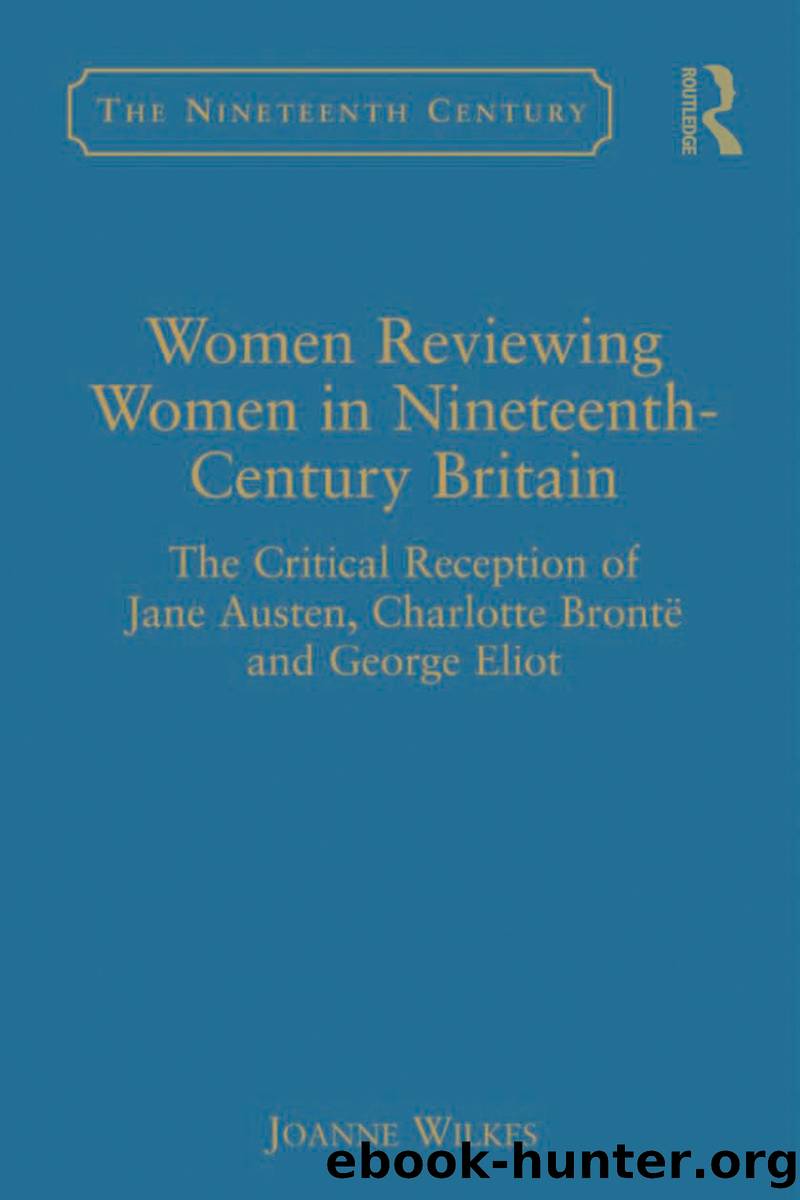Women Reviewing Women in Nineteenth-Century Britain by Wilkes Joanne;

Author:Wilkes, Joanne;
Language: eng
Format: epub
Publisher: Taylor & Francis Group
Published: 2021-08-15T00:00:00+00:00
If articulated in a female voice, this commentary may have seemed an overt complaint against male self-centredness; coming supposedly from a man, it ostensibly defends male interests while allowing readers to register the underlying egotism.
Finally, and most importantly for this discussion, Mozley demystifies any overstrained sense of the differences between the sexes by pointing to the contemporary proliferation of female writers. She implies that this development represents a healthier situation than obtained in the past, when readers accepted isolated female figures with pretensions to inspired genius, while not crediting the sex in general with literary potential. But nowadays, she says, âwomen write under the ordinary uninspired conditions in which most men write, from no stimulus of genius, but mere exercise of reason and intellect, and the cultivation of such powers as they possessâ: what represents progress, this suggests, is that women are now credited with âreason and intellectâ. Hence â[t]he public now accepts many women amongst its authorized instructors without doubt, or cavil, or sense of wounded prideâ, and if some of them may be âheavily sensible, and reasonably prosyâ, then this fact simply âbrings any woman into fair comparison with many highly esteemed authors of the sterner sexâ. Therefore âit is a great advance in the popular estimate of womenâs intellect, when they can write dull books with as complete and entire impunity as men canâ (436â7).
The opening up of writing as a career for women, a development Mozley locates in the nineteenth century, is also at stake in her article for Blackwoodâs which deals with the governessâs reminiscences from the 1820s. In this 1868 article, âClever Womenâ, Mozleyâs ventriloquising of a male critical voice enables her to make confident claims for women, while taking account of traditional conservative attitudes.
Here in her male persona, Mozley initially endorses some conventional notions about the disadvantages of âclevernessâ in women, notions based on a belief in significant intellectual differences between the sexes. The article contrasts the âclever womanâ with the âideal womanâ: although the latter âdoes not reasonâ, because âher processes of thought are intuitiveâ, yet âwe [men] bow to conclusions formed on no conscious data, with nothing like argument to back them, because in her own province, though she cannot reason, she is apt to be rightâ. But outside her own province, on questions of art, literature, politics, religion, and all public issues, she submits to masculine guidance. In contrast, â[c]lever women ⦠throw intuition over and aim at logicâ, cultivating the âanalytical facultyâ â with the result that they lose the capacity to use instinct âto serve their personal needsâ, and sacrifice the âsubtle powerâ of tact to âintellectual exercisesâ.23
23 âClever Womenâ, 411â13. Most of the rest of the piece, nevertheless, asserts the advantages of womenâs increasing access to writing, both as an occupation and as a means of earning a living. It expresses relief that far distant now are the days when Swift attacked learned women, and when people advised young women against âany exercise of mindâ for fear of discouraging potential marriage prospects.
Download
This site does not store any files on its server. We only index and link to content provided by other sites. Please contact the content providers to delete copyright contents if any and email us, we'll remove relevant links or contents immediately.
4 3 2 1: A Novel by Paul Auster(11788)
The handmaid's tale by Margaret Atwood(7447)
Giovanni's Room by James Baldwin(6808)
Asking the Right Questions: A Guide to Critical Thinking by M. Neil Browne & Stuart M. Keeley(5355)
Big Magic: Creative Living Beyond Fear by Elizabeth Gilbert(5351)
Ego Is the Enemy by Ryan Holiday(4956)
On Writing A Memoir of the Craft by Stephen King(4662)
The Body: A Guide for Occupants by Bill Bryson(4583)
Ken Follett - World without end by Ken Follett(4443)
Bluets by Maggie Nelson(4261)
Adulting by Kelly Williams Brown(4232)
Eat That Frog! by Brian Tracy(4149)
Guilty Pleasures by Laurell K Hamilton(4116)
White Noise - A Novel by Don DeLillo(3829)
The Poetry of Pablo Neruda by Pablo Neruda(3815)
Fingerprints of the Gods by Graham Hancock(3738)
Alive: The Story of the Andes Survivors by Piers Paul Read(3730)
The Book of Joy by Dalai Lama(3697)
The Bookshop by Penelope Fitzgerald(3619)
